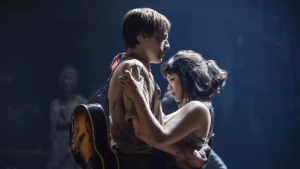Hadestown and Orpheus’s Tragic Reactivity

The Orpheus and Eurydice tale broke my heart when I first learned it in high school, and I have been in the bargaining phase of acceptance of it ever since.
It was one of the many contributors to my decision to become a relationship therapist.
I’m probably not kidding.
In short, the story is about two young lovers who are separated when Eurydice dies. Orpheus is so sad and so talented that his grieving song moves the gods to give him a chance to go to the underworld and take her back to life with him. The one condition is that on their journey back to living she must walk behind him and he cannot turn around to check on her. They are so close to making it out together, but he gives in to his doubt and turns around – separating them forever.
When I think of the story, I bargain things like: What if Hades gave them one more chance? Or maybe they needed to break up anyway and they both found happiness elsewhere? Maybe this was all a vision of things to come and Orpheus was able to correct his behavior before he made such a grave mistake?
It is very hard for me to accept that Orpheus just blew his chance at happiness with her and poof! She’s gone.
This tale has a profound meaning when we think of the more terrestrial things that desperate lovers do to ruin relationships forever. The modern Orpheus battles insecurities, so he cheats for validation. The modern Orpheus is hypervigilant for signs his partner will abandon him so he smothers his partner until the worry becomes a self-fulfilling prophecy. The modern Orpheus abandons his Eurydice before she can leave him.
And then there are the Orpheuses who are a little less dramatic, but slowly chip away at their loving connection through patterns of emotional reactivity. Verbal meltdowns and distancing, for example. These are the Orpheuses who do little peeks back – flirting with the risk of losing their partner…
Wow, this is getting sad. It’s such a sad tale!
Anyway, as the audience, we can see their tragic fate could have been avoided with trust. If Orpheus has built up his trust in himself and in Eurydice, he might have been able to emotionally endure long enough to see them both out.
Yes, I’m wishing that Orpheus had talked through his plans with a therapist and created an effective cognitive and emotional safety plan. I wish Orpheus and Eurydice had met with a couple therapist before their journey out of the underworld to fortify their communication and connection during such a stressful time.
The hit Broadway musical, Hadestown, by Anaïs Mitchell hauntingly depicts this story. The lyrics in the song “Wait For Me,” and its reprise, bring to life the psychological battles that doubt creates. The characters, “the Fates,” personify our worst fears and most pernicious inner voices that can drown out the voices of those reaching out to us. In this song they attempt to overpower Eurydice’s calls to Orpheus with their questioning.
My wish for people in love is this plot can stay fictional. That by working through insecurity, we need not lose love to distrust.
If you are interested in seeing Hadestown you are in luck! It’s coming to The Kennedy Center this October!
Wait for Me (Reprise)
From the musical Hadestown
Music and Lyrics by by Anaïs Mitchell
Lyric Sample:
[HERMES, spoken]
The meanest dog you’ll ever meet
He ain’t the hound dog in the street
He bares some teeth and tears some skin
But brother, that’s the worst of him
The dog you really got to dread
Is the one that howls inside your head
It’s him whose howling drives men mad
And a mind to its undoing
[ORPHEUS and EURYDICE]
Wait for me, I’m comin’
Wait, I’m comin’ with you
Wait for me, I’m comin’ too
